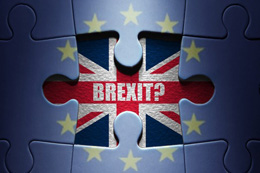 Photo Credit: pixelbliss
Photo Credit: pixelbliss
Results from the UK voting on the so-called “Brexit” (short for “British exit”) referendum came as a major surprise to political and financial commentators. The general expectation was that UK voters would decide to stay in the European Union. It appears that the opinion pollsters, bookies, and the markets (which had rallied in response to a purported trend toward a “stay” vote) got it wrong. As with all surprises, the immediate results are confusion and uncertainty regarding the ultimate impacts. This creates significant market volatility in equities, bonds, and foreign exchange (“FX”) markets. In the long term, one can expect some significant impacts on UK and EU macro-economic trends, which may spill over into the rest of the world, including the U.S. However, the magnitude and direction of the impacts will take time to become clearly visible, and only emerge over the next several years, as negotiations on the exit move forward. In the meantime, we will all have to live with more economic uncertainty and financial market volatility until the ultimate resolution becomes known.
The first thing to realize is that nothing may happen. The Brexit vote is not a binding action. The UK government and Parliament would still have to act on it by requesting withdrawal under Article 50 of the Lisbon Treaty. The details of final exit implementation would then have to be negotiated between the UK and the EU and its member countries. This process is expected to occur within a two-year window, which could even be extended over an additional third year. The result could well end up looking like an EU-UK free trade deal, which would have little economic impact, as there would be no trade barriers. Or, it could look like a UK-EU trade war, which would reduce macro-economic activity in all of the countries involved, and spill over to the rest of the world. The actual final trade and economic landscape in Europe will only become clear as the exit deal is hammered out over the next few years. Hence, it is too soon to predict the shape and dimensions of a final outcome.
There is a historical precedent for Brexit, however. When Greenland withdrew from the EU in 1982, the process took three years of negotiation, mainly about fishing rights. The results from those negotiations were very close to free trade between the EU and Greenland. Greenland was also able to expand other, non-EU trade. If this were to happen following Brexit, the dire economic predictions of the anti-Brexit partisans could be significantly mitigated or reversed. One hopes that all parties are serious and recognize the importance of free trade and capital flows to the entire world economy. In addition, the UK could seek to negotiate with other trade blocks (e.g., NAFTA), which could open additional markets to them, which could actually leave the UK better off.
The impact in the U.S. will mirror the impact in Europe, but as a much smaller percentage. Since it is too early to predict the macro-economic impacts on Europe, which impact the world economy and the U.S., we can only watch and wait for the process to unfold over time. Even under the worst-case scenarios, with the UK growth getting “hammered”, the impact on our economy would probably not be material.
However, one very dire possibility exists in the Brexit vote: the possibility of a snowball effect, in which other countries follow the UK’s suit, causing the EU economic union to be reduced in size and scope, or even disintegrate. In this case, the stabilizing influence of the EU would be greatly diminished and European economies could become protectionist. In such a scenario, trade among the EU countries would have more red tape and restrictions, imposing additional burdens on commerce. In the extreme, Europe could revert to 1930’s style beggar-thy-neighbor trade policies, bring retaliation, and lead to a very significant global economic recession. This would have an adverse consequence globally and could lead to more adverse political and diplomatic developments, as the depression of the 1930s did.
The UK still has its own currency - the pound. Thus, the UK’s departure from the EU would not cause monetary policy disruptions or currency shortages in Britain. The Bank of England still functions as the UK’s central bank, and will be able to conduct monetary policy to help manage its economy, as before. Other countries using the Euro are more reliant on the ECB, which means they might be more inclined to stay in the EU.
Initially, the pound has already dropped significantly after the UK vote. As noted above, the pound may become more volatile, so assets denominated in sterling will also become more volatile. This may impact the UK and European securities, especially financial sector securities, adversely. Thus, due to both increased “political” (i.e., country) risk and FX risk arising from market volatility, pound and euro denominated assets, such as obligations of European and UK banks, will become riskier. As an immediate result, the U.S. dollar has already risen relative to both the pound and the euro. Whether such depreciation of UK and EU currency values will remain is an open question, but one can expect the volatility of the FX markets to remain elevated.
One potential banking system result of Brexit could be its impact on the use of Libor as benchmark rates by banks around the world. If the UK leaves the EU, the importance of the London financial markets will likely be reduced. Short-term Libor rates (one- to three-month) have been volatile recently, and there were some actors already looking for more stable alternatives. Brexit could, and probably will, increase Libor instability and add further impetus to a shift to other benchmark rates. Considering the wide-spread use of Libor in financial agreements, the increased volatility of Libor rates could impact our U.S. community banks.
Interest rates in the U.S. may also be impacted by the “flight to quality”, which is always generated by global uncertainty. Such increased demand for U.S. assets and dollars will tend to stabilize, or actually reduce, U.S. interest rates in the near term. In addition, the Federal Reserve may be inclined to hold off on rate increases for this year as a response to the possibility of adverse global macro-economic effects from Brexit. Many commentators have already expressed the opinion that the Fed’s gradual rate increase policy will not occur for the rest of 2016. Indeed there is also discussion, or renewed discussion, of such topics as additional quantitative easing or negative interest rates in Europe to stimulate their economies. Such actions could further impact U.S. monetary policy away from tightening.
In summary, the main short-term results of the Brexit vote are higher economic uncertainty and increased volatility in the markets. In the short term, the dollar has strengthened; U.S. interest rates will probably not increase. The longer-term macro-economic impacts will emerge slowly over the course of the next two to three years of negotiation. The actual result of the vote could range from no exit at all, to minor impacts, if the UK uses the leverage from the vote to gain concessions from the EU and remain in it, or as new UK-EU free trade arrangements evolve, or to severe impacts, if the EU disintegrates or an EU-UK trade war begins. At present, an “all out” trade war appears unlikely because it is essentially a lose-lose policy. In the shorter term, we can also expect to see caution in the U.S. monetary policy and stable, if not declining, rates. Finally, Libor rates may become more volatile and the use of Libor benchmark rates may decline in the future. The long-term effects of the Brexit vote seem to be toward increases in economic uncertainty and market volatility while the exit details are negotiated over the next two to three years.
Comments |
Add a comment
- Required fields are marked with *.

Jim Cole
Senior Quality Control & Review Specialist
The OnCourse writing staff work to keep you informed about the most pertinent financial industry news of the moment
Jim's Posts



